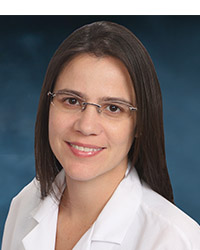March is observed as Colon Cancer Awareness month. Did you know that colon cancer is one of the most common forms of cancer? And if detected early, it is also one of the most preventable. Colorectal Cancer can affect both men and women and at the Cayman Islands Cancer Society, we have seen an increase in the number of cases over the years. Unfortunately, these cases are at a late stage. During this month, we have teamed up with gastroenterologists affiliated with Gastro Health and Baptist Hospital of Miami, to provide a better understanding on colon cancer and some of the more common diseases of the colon.
 Dr. Flavia Mendes – Dr. Flavia Mendes is a gastroenterologist in Miami, Florida and is affiliated with Gastro Health Group and Baptist Hospital of Miami. She received her medical degree from Federal University of Ceara Faculty of Medicine and has been in practice for 11 years.
Dr. Flavia Mendes – Dr. Flavia Mendes is a gastroenterologist in Miami, Florida and is affiliated with Gastro Health Group and Baptist Hospital of Miami. She received her medical degree from Federal University of Ceara Faculty of Medicine and has been in practice for 11 years.
PREVENTING COLON CANCER
Colorectal cancer (cancer of the large intestine or rectum) is the second most common cause of cancer deaths in the United States. Around the world, it is the second most common cancer diagnosed in women and the third most common cancer in men. Approximately 5 in 100 people without risk factors will develop colorectal cancer in their lifetime.
There are several factors associated with increased risk of developing colorectal cancer, including age, family history of colon cancer, inflammatory bowel disease and African American race. This cancer is uncommon in people younger than 40 years old, and the majority of the cases occur after 50 years of age. An individual with a single first-degree relative with colon cancer has a twofold risk increase of developing colon cancer when compared to the general population.
Several studies have shown that physical activity, consumption of fruits and vegetables and high fiber content in the diet may decrease the risk of colorectal cancer. Additional steps you can take include avoiding smoking, excessive alcohol, and the consumption of red meat.
Most cases of colorectal cancer begin as small “growths” called polyps (or adenomas). Over time, these polyps may grow and become malignant (cancerous). Screening tests have been developed to detect polyps and prevent them from transforming into cancer and/or to detect colon cancer at an early stage, allowing for successful treatment and decreasing the chance of death from the disease.
Current guidelines recommend that all adults be screened for colorectal cancer starting at the age of 50, even if there are no signs or symptoms of the disease. Patients with risk factors such as family history and inflammatory bowel disease should also be screened. African Americans/Afro-Caribbeans may need to start screening at an earlier age and/or more frequently than the general population. Once adenomatous polyps are detected, the person is also considered at increased risk and will require surveillance with examination at shorter intervals. Regular screening has been shown to reduce the risk of developing colorectal cancer by up to 90 percent.
A Colonoscopy is the most complete screening test available, as it can detect most small polyps and almost all large polyps or cancers. It has the advantage of allowing for removal of the detected polyps, preventing the development of cancer. If a lesion suspicious for cancer is found, biopsies can be done at the same time for diagnosis.
If you are 50 years of age or older, or if you have any of the risk factors listed above and have never had a colonoscopy or other screening tests for colorectal cancer, you should discuss this with your physician. Colorectal cancer can be prevented!
 Dr. Alfredo Hernandez – Dr. Alfredo J. Hernandez is Board Certified in Internal Medicine and Gastroenterology/Liver Diseases. He is affiliated with Gastro Health and Baptist Hospital of Miami and Doctors Hospital.
Dr. Alfredo Hernandez – Dr. Alfredo J. Hernandez is Board Certified in Internal Medicine and Gastroenterology/Liver Diseases. He is affiliated with Gastro Health and Baptist Hospital of Miami and Doctors Hospital.
Evidence Points to Colonoscopy in Preventing Colorectal Cancer
Colorectal Cancer, also known as Colon Cancer, is the third most common occurring cancer and the second leading cause of cancer-related deaths worldwide. There are two basic ways to screen for colorectal cancer. One way is by collecting stool specimens. The second is by evaluating the lining of the colon, which is done by having a Colonoscopy, Sigmoidoscopy, Barium Enema, or a CT Colonography.
A Colonoscopy is considered the most comprehensive method to detect and prevent colorectal cancer. The procedure consists of inserting a thin, flexible tube into the rectum and evaluating the entire colon. This method allows the physician to locate and remove precancerous, or adenomatous, colon polyps.
A recent New England Journal of Medicine article titled Colonoscopic Polypectomy and Long-Term Prevention of Colorectal-Cancer Deaths, shows that removal of precancerous polyps through colonoscopy reduced the death rate from colorectal cancer. This study is one of the first research papers looking at how colonoscopy can not only reduce the incidence of colorectal cancer, but can actually decrease mortality or death from it. The study analyzed prospectively 2,602 patients that had initial colonoscopy and precancerous polyp removal. There were only 12 deaths from colorectal cancer reported in the group studied. When compared to a group from the general public with similar age, sex and race, the number of deaths from the disease was about 25 individuals. Resulting in the conclusion that colonoscopy reduced the incidence of colorectal cancer associated death by 53%.
The guidelines from the American College of Gastroenterology for colorectal cancer screening call for all average risk individuals, male and female, to undergo colonoscopy at the age of 50. Other populations with risk factors or symptoms may have varying age for colonoscopy. For example, African Americans/Afro-Caribbean as a subgroup are recommended for screening at age 45. Patients need to be aware that there are other methods of colorectal cancer screening if colonoscopy is not available to them. If the other methods have positive findings, however, colonoscopy will then be advised. The overall evidence continues to point to colonoscopy reducing the risk of colorectal cancer and even mortality.
Dr Andrew Sable – Dr. Andrew Sable is a Board Certified Gastroenterologist with Gastro Health, a prominent medical group made up of physicians and specialists who are experts in gastroenterology disorders, nutrition and digestive health. He is also affiliated with Baptist Hospital of Miami
IBS: The Old and The New
IBS (irritable bowel syndrome) is functional disorder of the gastrointestinal tract, meaning it is caused by a problem with the way the gastrointestinal tract works. People who suffer from IBS do not have intestinal tract damage, but rather suffer from a constellation of symptoms that occur together.
For those people recently diagnosed with IBS or those who have suffered for many years, it remains important to understand that IBS is a chronic but manageable condition. There is no single treatment or medication for IBS. Successful treatment depends on a close and on-going relationship with your physician as well as lifestyle and dietary changes and the use of medications.
Lifestyle and Dietary Changes
Keeping a dietary log will help you recognize foods that may trigger symptoms. Limiting caffeine and alcohol intake, minimizing dairy products, and avoiding sugar substitutes and artificial sweeteners can significantly decrease the frequency and urgency of diarrhea. Avoiding beans, uncooked vegetables and lowering the fat content of your foods may alleviate gassiness and bloating. Daily fiber supplements and increased water intake help with constipation-predominant IBD (IBS-C).
In addition to dietary changes, lifestyle modifications help reduce symptoms in IBS as well. Smoking cessation is critical for overall health as well as the health of your intestinal tract. Regular physical exercise has been shown to reduce the frequency of symptoms and protect against symptom deterioration. Several studies have also demonstrated the benefits of stress management through behavioral modification on the symptoms of IBS.
Medications for IBS
Keeping in mind that the treatment of IBS is multi-faceted, medications play an important role. Traditionally anticholinergic medications such as Bentyl and Nulev have been used to help temporarily alleviate bloating and discomfort. Imodium can be helpful for those with frequent diarrhea and urgency. Fiber supplements seem to benefit those with constipation and alternating IBS-D and IBS-C. Antidepressants and anti-anxiety medication may also provide some benefit for more chronic symptoms. Within the last several years, probiotics and even antibiotics have been used with some success in IBS. This benefit may be due, in part, to bacterial imbalances in the intestine that may exist in patients who suffer from IBS.
Some of the recently approved medications for IBS have a more specific focus. Several years ago, Lotronex (Alosetron) was approved for women with IBS and diarrhea; this medication is designed to relax the intestine and slow the transit of stool thereby helping with diarrhea and bloating. Only a gastroenterologist should prescribe this medication. Amitiza (Lubiprostone) is prescribed for adult women and men who have IBS with constipation. It is taken twice a day and works by increasing the fluid secretion into your intestine thereby softening your stool and increasing bowel movements. This medication has a long track record and has been shown to be safe and effective in patients with IBS-C and also those with chronic constipation as well. The “new kid on the block” is Linzess (Linaclotide). It is a novel medication that gained FDA approval in late 2012 to treat patients with chronic constipation and those with IBS and constipation. Linzess is taken once daily and has been shown to relieve discomfort associated with IBS-C and help with more complete evacuation of stools.
IBS Symptoms Can Be Treated
Estimates suggest that IBS affects up to 15% of Americans. Because of its chronic and episodic nature, IBS has considerable impact on its sufferers’ lives. The most important thing to keep in mind is that IBS symptoms can be treated. Establish a good relationship with your physician and make sure you are fully evaluated for other potential underlying diseases. Treatment of IBS involves long-term strategies using a combination of lifestyle changes, dietary modifications and medication to minimize symptoms.

